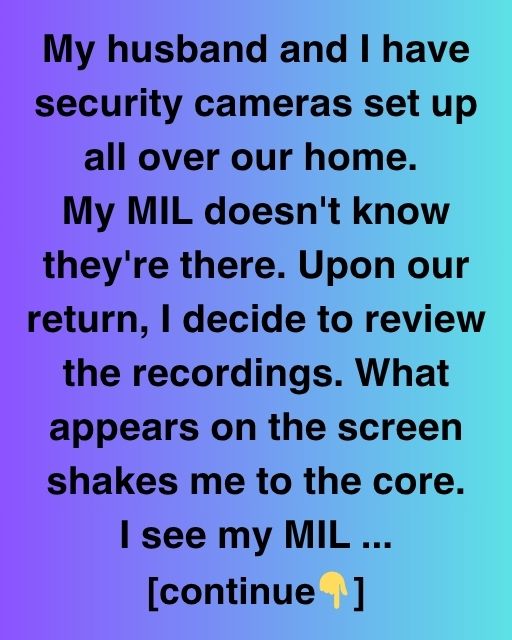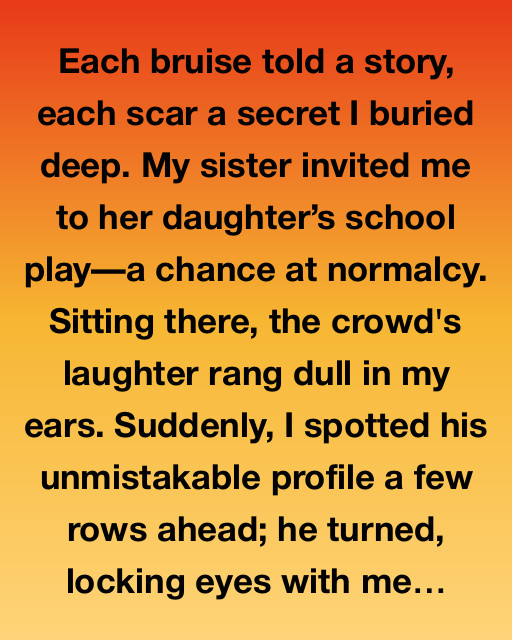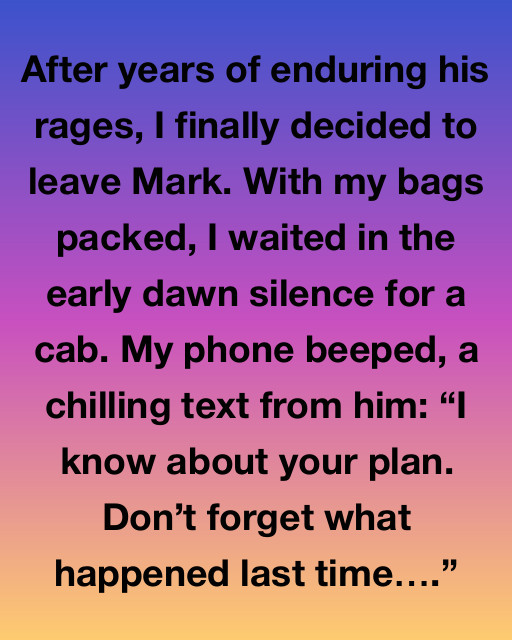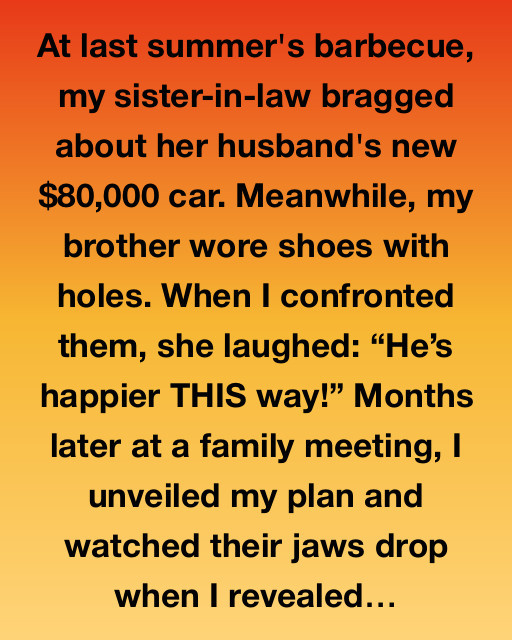My husband and I have security cameras set up all over our home. My MIL doesn’t know they’re there. Upon our return, I decide to review the recordings. What appears on the screen shakes me to the core.
I see my MIL, Lydia, moving through our house like it belongs to her, opening drawers, rummaging through closets, and even taking money from a small wooden box we keep in the kitchen. My heart pounds as I watch her slip a wad of cash into her purse, look around like a guilty child, and walk away as if nothing happened.
I paused the video and tried to catch my breath. The woman who smiled at me at every family gathering, who always brought over her famous lemon pound cake, had been stealing from us.
I didn’t know what hurt more—the fact that she had done it or the fact that she thought we’d never find out. I called my husband, Dorian, into the living room. He looked confused until I pressed play and he saw his own mother’s face on the screen.
For a long moment, neither of us spoke. I could almost hear the thoughts rushing through his mind. He looked torn between disbelief and anger. He ran his hand through his hair and sat down heavily on the couch.
“Why would she do this?” he whispered. His voice cracked like a boy’s. I wanted to hug him, but I also needed answers. I felt betrayed, and I could see he did too. Our home felt different now, like it had been tainted.
Later that evening, I tried to bring it up gently over dinner, but Dorian stopped me. “I need to handle this myself,” he said. I nodded, though I didn’t like the idea of him facing his mother alone.
The next morning, he called her to come over. I watched through the kitchen doorway as he sat her down at the dining table. He looked so much like a little boy again, vulnerable and scared, as he played the footage for her on his tablet.
Lydia’s face went pale. She looked between her son and the screen, her eyes wide, mouth opening and closing like a fish. Tears welled up, but no words came out. When she finally spoke, it was a flood of excuses.
She said she’d only taken “a little” because she was “in a tight spot.” She tried to blame rising bills, loneliness, and even said she thought we wouldn’t miss it. I almost laughed—our mortgage was steep, our jobs were stressful, and we were trying to start a family. Every penny mattered.
I stepped into the room and asked her why she hadn’t just told us she needed help. She started sobbing, her hands trembling on the table. Between choked sobs, she said she was embarrassed.
She’d always been the strong matriarch, the one who saved the day, the one who never asked for anything. I felt a sliver of sympathy pierce through my anger. But I couldn’t shake the violation I felt knowing she’d crept through our bedroom, our sanctuary, without our knowledge.
We decided she needed to leave our house that day. As she gathered her things, I noticed her eyeing the security camera in the corner of the living room. She gave it a wary glance, like it was some sentient being that had betrayed her secrets. I almost told her that if it weren’t for that camera, we’d still be living a lie, but I bit my tongue. Some truths didn’t need to be spoken out loud.
For weeks after that confrontation, Dorian didn’t speak much. We went through our days in a fog. Work felt pointless, our meals were silent, and we barely touched each other. At night, I’d wake up to find him staring at the ceiling. Once, I heard him whisper, “I can’t believe my own mother would do this.” It broke my heart. I hated what this had done to him, to us.
Then something unexpected happened. One evening, I got a call from Lydia’s neighbor, Mr. Patel. He was a kind, elderly man who always waved when we visited her. He told me he’d seen Lydia crying on her porch more than once lately. He sounded worried.
He said he’d offered to help her, but she refused to even let him bring over groceries. That night, I realized this wasn’t just about stolen money. This was about a woman who had lost her way, who was too proud to ask for help and too scared to admit she was drowning.
I brought it up to Dorian, and for the first time in weeks, I saw something soften in his eyes. We decided to pay Lydia a visit together. When we arrived, she was surprised, her eyes puffy and red.
The house smelled musty, like it hadn’t been cleaned in weeks. She looked smaller somehow, hunched over, defeated. I wanted to hate her for what she’d done, but seeing her like that made my anger feel hollow.
We talked for hours that evening. She told us how she’d been struggling to pay off debts since her husband died. She confessed that her pension barely covered utilities, let alone food and medication.
She felt ashamed to admit it to her son. She said she’d started taking small amounts from us, convincing herself she’d pay it back once she “got back on her feet.” But of course, that day never came.
Hearing her story didn’t excuse her actions, but it made us understand. I suggested we help her set up a payment plan for her debts. She looked shocked, then relieved. For the first time, I saw her eyes sparkle with hope instead of fear. We also helped her sign up for programs for seniors in need. It felt good to offer real help instead of just judging from afar.
A few weeks later, things slowly began to heal between us. Lydia started coming over for Sunday dinners again, but there was a new honesty between us. She didn’t bring her lemon pound cake for a while, but she did bring stories about her youth, sharing moments we’d never heard before. Dorian began to smile more. Our home felt warm again.
But the story doesn’t end there. One Saturday, we decided to invite Lydia to stay with us for a few days so she wouldn’t feel so alone. That night, I went into the kitchen for a glass of water and caught her sitting at the table, staring at the security camera. She looked up, her eyes sad but determined. “Thank you,” she said softly, “for not giving up on me.”
I sat down with her, and we talked until sunrise. She told me about her fears of becoming a burden, her regrets about not being closer to us before things spiraled. I admitted that I had been afraid of her judgment too, afraid she’d think I wasn’t good enough for her son. We both laughed at how silly it seemed now. We realized how much we’d missed by not being honest with each other sooner.
The next day, Lydia offered to watch our dog, Biscuit, while we ran errands. When we came back, we were greeted by the smell of lemon pound cake. She was in the kitchen, laughing as Biscuit chased flour she’d accidentally dropped on the floor. I felt something lift off my chest. The air felt lighter, like our home was truly ours again.
Later, we sat down with her and made a family plan. Every month, we’d help with her expenses, but she’d also join us for meals, game nights, and outings. We promised her that she’d never have to steal or feel alone again. She promised to be honest about her needs. It wasn’t just about money anymore—it was about rebuilding trust and choosing to move forward as a family.
In the months that followed, we started noticing changes in her. She signed up for a community pottery class, made new friends, and even began volunteering at a local shelter. She had a spark we hadn’t seen before. She often told us how grateful she was that we’d confronted her instead of cutting her out. That conversation, painful as it was, became the turning point for all of us.
There were moments of awkwardness, like when she’d glance at the cameras and visibly check herself, or when Dorian would hesitate before leaving his wallet on the counter. But over time, those moments became fewer. We found our way back to laughter and warmth, and our home became a place of comfort again, not suspicion.
One afternoon, Lydia surprised us with a scrapbook she’d made. It was filled with photos of our family over the years, tickets from concerts we’d gone to, recipes she’d taught me, and notes about her favorite memories with us.
On the last page, she’d written a letter apologizing for betraying our trust and thanking us for giving her a second chance. We all cried reading it together.
A few weeks later, she invited her new friends from the pottery class over for dinner. Our house was full of chatter, clinking glasses, and the smell of pasta baking in the oven. Lydia beamed like a proud host, introducing us to everyone.
I looked over at Dorian, who was laughing with one of her friends, and realized how far we’d come from the night we first watched that devastating footage.
We learned to communicate better after that ordeal. We talked openly about money, fears, and expectations. We even installed a camera at Lydia’s house—not to spy on her, but so she could feel safer living alone. She called it her “guardian angel,” and I think it made her sleep better at night.
One evening, as we sat on the porch watching the sunset, Lydia turned to me and said, “I know what I did was wrong. But I think God gave me that mistake to bring us closer.” I squeezed her hand, and for the first time, I truly believed it.
Our relationship had been tested and broken, but it was stronger than ever now. We didn’t need to pretend anymore. We were a family, flaws and all.
The whole experience taught us that sometimes, the people we love make choices that hurt us, but it doesn’t always mean they’re bad people. It can mean they’re desperate, scared, or lost.
By choosing to confront with love instead of anger, we found healing we never thought possible. I realized forgiveness isn’t about excusing someone’s behavior; it’s about giving both sides a chance to heal and grow.
Now, whenever I see the cameras in our home, I don’t feel uneasy. I feel grateful. They didn’t just catch a thief—they caught a cry for help we would’ve missed otherwise. Those little blinking lights gave us a chance to fix something we didn’t know was broken.
So if you’re reading this and you’re going through something similar, don’t let fear or pride keep you from having the hard conversations. You might find, like we did, that honesty can lead to understanding, and understanding can lead to a bond deeper than you ever imagined.
Thanks for reading our story. If it touched your heart or made you think, please like and share it. You never know who might need to hear that it’s never too late to forgive, heal, and love again.




